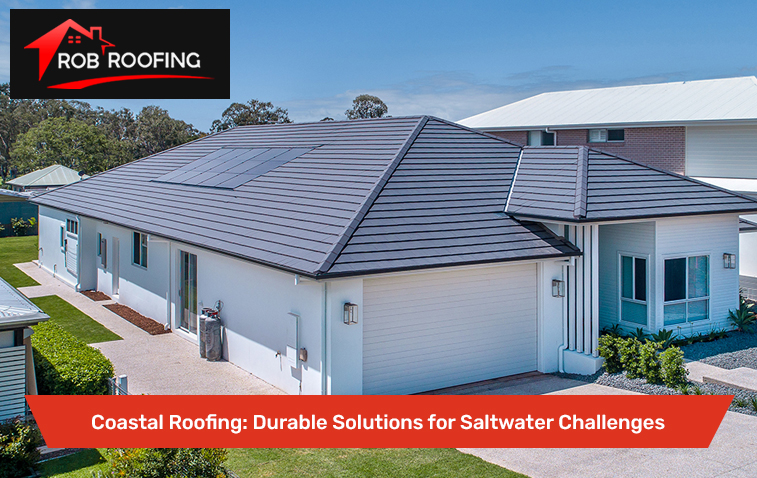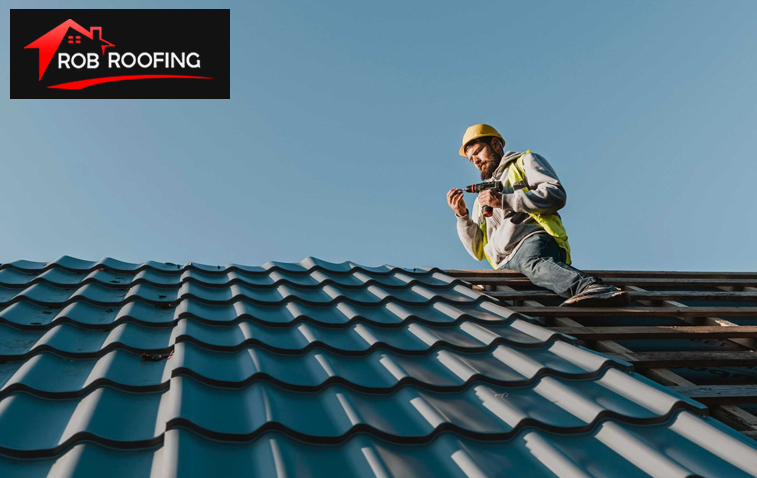Coastal Roofing: Durable Solutions for Saltwater Challenges
Building a home in coastal areas is as beautiful as it is challenging, especially when it comes to roofing. Saltwater and strong winds can damage roofs, shortening their lifespan. For people living in coastal areas, choosing a strong and durable roof is a must. These roofs not only protect the home, but are also easy to maintain in the long run.
The effect of saltwater gradually weakens roofing materials. Therefore, choosing materials that can withstand rust and corrosion is the best solution. With the right roofing materials and care, you can keep your home’s roof safe for decades. Now let’s know what sustainable solutions are available to protect roofs in coastal areas.

Saltwater Corrosion
The salt present in seawater and air in coastal areas corrodes roofing materials. This effect is gradual, but its effects are profound and harmful. Salt rust becomes a serious problem for roofing. Its effects are especially visible very quickly on metal roofs.
Corrosion and its effects
The salt present in salt water reacts with metal and other materials, causing them to rust. This weakens the roof, and can cause holes in the roof or cracks in the material. Corrosion also affects the structural durability of the roof. Over time, if it is not taken care of, it can also endanger the overall durability of the roof. Therefore, the use of corrosion-resistant materials is very important in coastal areas.
Role of corrosion-resistant materials
The use of corrosion-resistant materials for roofing is very important in coastal areas. Instead of metal, materials should be used that can avoid the effects of corrosion. This not only increases the life of the roof but also reduces the need for periodic maintenance.
Solution #1: Metal Roofing
Metal roofs are considered to be a very popular and sustainable option for coastal areas. But it is important to note that not all metals are suitable for this area. Some metals can corrode quickly, especially when exposed to salt water.
Benefits of metal roofs
Metal roofs are especially known for their durability. They come with a variety of rust-resistant treatments that protect against the effects of saltwater. Metal roofs can easily withstand rain and strong winds. Apart from this, metal roofs also perform well in summer and winter. Metals like aluminum, galvanized steel and zinc are considered very suitable for withstanding the effects of saltwater in coastal areas.
Choosing the right type of metal
Not all metals are equally effective for coastal areas. Therefore, rust-resistant metals like aluminum are considered the best choice. Aluminum is not only rust-resistant but also has low maintenance costs. Galvanized steel is also another good option, which has rust-resistant coatings that protect the metal for a long time.
Solution #2: Slate Tiles
Slate tiles are another excellent option for coastal areas. Slate is a natural stone that is able to withstand saltwater and other weather effects. Its natural beauty and durability make it a popular choice.
Advantages of Slate Tiles
Slate tiles are known for their strong and durable texture. They are less affected by salt water and are not prone to rust or corrosion. Moreover, slate tiles also act as natural thermal insulators, keeping the house cool in summers and warm in winters. These tiles are durable for decades, making them a great choice for coastal areas.
Maintenance and Durability
The biggest feature of slate tiles is that they require very little maintenance. Once installed properly, they will last for decades without any major maintenance. All you need to do is get them checked from time to time so that any cracks or wear and tear can be repaired in time.
Solution #3: Rubber Roofing
Rubber roofs can also prove to be a good option for coastal areas. Rubber roofs can withstand salt water and moisture and are not prone to rust or corrosion.
Benefits of Rubber Roofs
Rubber roofs are especially known for their flexibility and durability. They are also resistant to the effects of salt water. In addition, rubber roofs also act as thermal insulators, reducing the energy consumption of the home. They are easy to install and require very little maintenance.
Installation and Longevity
Rubber roofs are easier to install than other materials. These roofs can last for 20 to 30 years without any major maintenance. Periodic cleaning of the surface and repair of any cracks or breaks are all that is needed to maintain the stability of the roof.
Solution #4: Composite Shingles
Composite shingles are more durable than traditional roofing materials. They are able to withstand the effects of salt water and strong winds in coastal areas.
Benefits of Composite Shingles
Composite shingles are stronger than traditional asphalt shingles and are ahead of them in terms of durability. These shingles are lightweight and easy to install. Also, composite shingles are not affected by salt water and moisture, which is a big advantage in coastal areas.
Comparison and Durability
Composite shingles have a much higher durability than traditional shingles. These shingles last for a long time without any maintenance and are able to withstand salt water. They last a long time in coastal areas, keeping the roof of the house safe.
Solution #5: Ceramic Coatings
Ceramic coatings provide a protective layer on the roof surface that prevents damage caused by salt water.
Role of Ceramic Coatings
Ceramic coatings protect the roof surface from water and moisture. They form a thin but strong layer on the roof surface that prevents water from penetrating. This makes the roof more durable and safe.
Application and Effectiveness
Ceramic coatings are applied to the roof surface by spray or brush. These coatings last a long time and increase the protection of the roof. In coastal areas, the use of ceramic coatings is an effective way to protect the roof from salt water damage.
Solution #6: Stainless Steel Fasteners
The use of stainless-steel fasteners is a very important step to protect roofs in coastal areas.
Importance of Stainless-Steel Fasteners
Stainless steel fasteners do not rust from salt water and keep the roof structure strong. Their use helps in increasing the stability and durability of the roof. It is an indispensable solution for protection against salt water and strong winds.
Effect on structure
Stainless steel fasteners keep the roof structure safe and strong. Without them, the roof can become weak and the risk of rust increases. Their correct use helps in increasing the life of the roof.
Solution #7: Wind Resistance Features
In coastal areas, strong winds have a great impact on the roof. Therefore, certain structural modifications are necessary in the roof design to protect it from winds.
Design to withstand winds
The roof should be designed in such a way that it can withstand the pressure of strong winds. The use of strong beams and strong joints keeps the roof strong. Also, it is important to build the roof structure keeping in mind the flow of air so that the roof remains safe from wear and tear.
Structural modifications
Additional modifications in the roof like strong beams and strong joints can be used to protect it from strong winds. This provides stability to the roof and reduces its damage. This is very important for protection from winds and salt water in coastal areas.

Solution #8: Regular Maintenance and Inspections
Regular maintenance and inspections are very important to maintain the safety and durability of the roof.
Regular maintenance
Maintenance includes regular cleaning of the roof, minor repairs, and checking of water drainage. Periodically inspecting the roof surface and repairing any cracks or tears is important to maintain the durability of the roof.
Inspection Highlights
Roof inspections should include checking the material, the stability of fasteners, and the correct condition of the roof slope. Periodic inspections can prevent major problems and increase the life of the roof.
Choosing a durable solution for roof protection is very important in coastal areas. Options such as metal roofing, slate tiles, rubber roofs, and ceramic coatings are extremely effective at protecting against salt water and strong winds. With these measures, regular maintenance and inspections, you can keep your roof safe and long-lasting.
